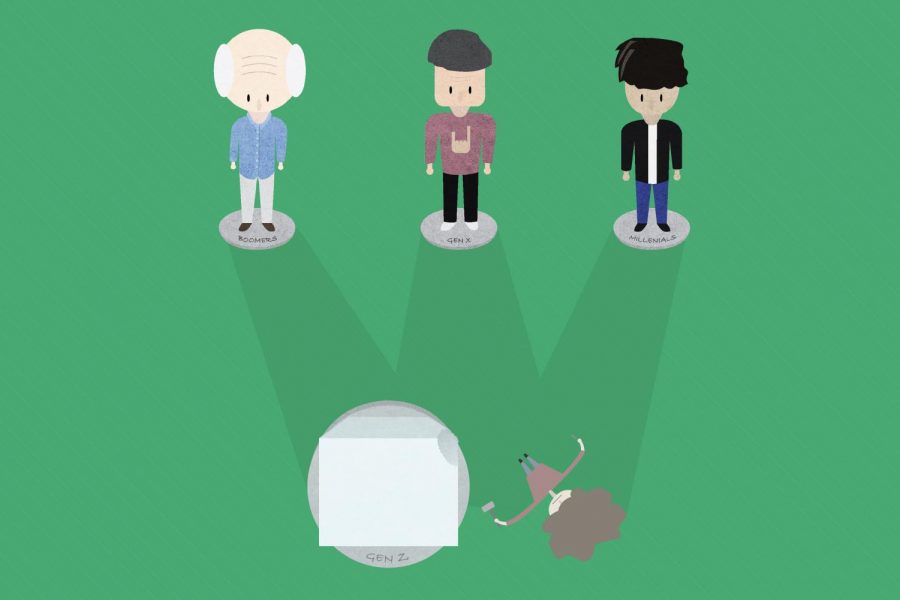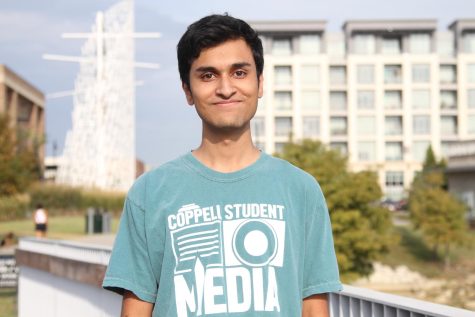Editorial: Our futures are not a group project
Gen Z should have primary say in modern education
Generation Z has experienced several significant events that have exposed them to the real world. The Sidekick editorial board discusses why this new generation calls for a different way to educate and to learn.
May 14, 2021
Generation Z is an x variable in the equation of the modern world. The oldest Gen Z is 24 years old, the youngest is 9. Not only are we mostly in the dark about what makes us unique as a generation, we’re also the “new kids on the block,” and the big kids – Baby Boomers, Generation X and Millennials – aren’t too happy to have us around.
Generational divides present themselves in our everyday lives. Each generation goes through different life experiences and therefore may hold varying beliefs and morals. Though they may be fundamentally divergent, it’s time for older generations to step back and make room for the next group of people.
Gen Z, at such ripe ages, has lived through and is currently experiencing a global pandemic, multiple mass shootings, the effects of systemic racism being spotlighted, the impact of climate change, a global financial crisis and the aftermath of a terrorist attack that took more than 3,000 lives – just to name a few. To top it all off, we are constantly connected to these international or domestic events via technology, giving us an unprecedented amount of perspective and empathy for other people undergoing different circumstances. These are the moments that will shape our beliefs and morals.
We are a generation dealing with a surplus of information, and because of that, older generations do not have a right to discredit our knowledge on what “real problems” look and feel like any longer. Having lived through so many momentous historical events that were caused by older generations, it’s about time we gain more control over our own lives. That means having a firmer grip on how and what we are educated.
Gen Z isn’t afraid to use social media to tear down the platforms of those who do not deserve it, a process known as cancel culture. Although arguably a blessing and a curse, cancel culture has provided us with the opportunity to discuss social issues on a more expansive level, leading us to care about how our short-term actions have long-term consequences.
Wielding Twitter and TikTok as weapons, Gen Z was able to tamper with Donald Trump’s rally in Tulsa back in June, flood multiple racist hashtags on Twitter with videos of K-Pop celebrities and organize protests for the Black Lives Matter movement both locally and nationally.
Time has become our greatest teacher and Gen Z has proven to be quick learners. If this new group of students can learn so much and adapt with such little reaction time, then perhaps it’s an indicator that the modern student has outgrown 60-minute lectures, textbooks and standardized tests. There are better ways to evaluate the effectiveness of learning than 30 pages of notes and multiple choice bubbles.
So what does Gen Z really want to gain from school you may ask? It’s simple. Change the objective of school from joining the workforce or getting into college to becoming more self-made and well-rounded human beings. What we learn in school should also reflect the changes happening around us so we can apply our learning to the real world.
That means allowing high school students to build their own class schedules based on the skills and interests they have. This way, students will be more productive for longer periods of time – not because they have to, but because they want to. Make mental health and emotional development priorities in school. When either are lacking in a learner, education suffers. It means less school hours. In Finland, teachers work half the total time American teachers do in order to increase the quality of education rather than the quantity.
The Texas Education Agency (TEA) requires students to take specified social studies, science, math and English courses, a physical education, fine arts class, along with two years of a language they will likely not become fluent in during high school in order to graduate. The required core curriculum occupies the majority of one’s high school career, leaving very little room to explore the available electives, which feign the freedom of choice while also limiting the options within the boundaries of their endorsement. Endorsements carry their own requirements for the electives a student can take, and the big-picture benefit is a few experiences you might find useful when you get to college.
This “one-size fits all” method of teaching students doesn’t work for everyone. If the goal is to provide education that is useful to everyone but the antidote to the problem isn’t easily executed, let Gen Z be responsible for their high school careers. Boomers, Gen X and Millennials should supervise, guide and encourage, but ultimately, the reigns belong in the hands of high school students now and for years to come. Five years worth of Gen Z students have already missed their opportunity, but it isn’t too late.
If this isn’t the first time that students have voiced their opinions on their education and research shows that the American education system is often ineffective and impersonal, when will change come? When will older generations let go and make way for the inevitable new?
Gen Z should have pride in being a sign of the times through their worldly impact. This past year is proof that hitting the ground running is what we do best, so where we run to and how we get there should be on our terms too.
Follow @CHSCampusNews on Twitter.










